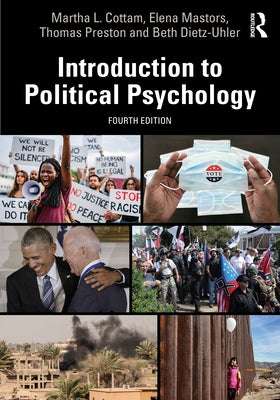Description
Introduction to Political Psychology explores the many psychological patterns that influence individual political behavior. The authors introduce readers to a broad range of theories, concepts, and case studies of political activity, arguing that individuals are driven or motivated to act in accordance with personality characteristics, values, beliefs, and attachments to groups. The book explains many aspects of political behavior--whether seemingly pathological actions or normal decision-making practices, which sometimes work optimally, and sometimes fail.
Thoroughly updated throughout, the book examines patterns of political behavior in areas including leadership, group behavior, voting, race, nationalism, terrorism, and war. This edition features coverage of the 2016 election and profiles former U.S. President Donald Trump, while also including updated data on race relations and extremist groups in the United States. Global issues are also considered, with case studies focused on Myanmar and Syria, alongside coverage of social issues including Black Lives Matter and the #MeToo movement.
Accessibly written and comprehensive in scope, it is an essential companion for all graduate and upper-level undergraduate students of psychology, political science, and political psychology. It will also be of interest to those in the policy-making community, especially those looking to learn more about the extent to which perceptions, personality, and group dynamics affect the policy-making arena.
It is accompanied by a set of online instructor resources.
Author: Martha L. Cottam, Elena Mastors, Thomas Preston
Publisher: Routledge
Published: 05/03/2022
Pages: 586
Binding Type: Paperback
Weight: 2.26lbs
Size: 10.00h x 7.00w x 1.21d
ISBN13: 9780367200015
ISBN10: 0367200015
BISAC Categories:
- Political Science | International Relations | General
- Psychology | Social Psychology
- Political Science | Political Process | General
About the Author
Martha L. Cottam is professor emeritus of political science in the School of Politics, Philosophy, and Public Affairs at Washington State University, USA. She specializes in political psychology, international politics, and intercommunal confl ict. She has published books and articles on U.S. foreign policy, decision making, nationalism, and Latin American politics. She received her Ph.D. from UCLA.
Elena Mastors is a lecturer at Johns Hopkins University, USA. She was an academic administrator for over a decade and also served as an associate professor in the National Decision Making Department of the Naval War College. She has held various senior intelligence and policy positions in the Offi ce of Undersecretary of Defense for Intelligence and the Defense Intelligence Agency.
Thomas Preston is a professor of political science in the School of Politics, Philosophy, and Public Affairs at Washington State University, USA. He specializes in political psychology, leadership analysis, and international politics. He has written numerous books and articles on presidential leadership, weapons of mass destruction, and American foreign policy. He received his Ph.D. from Th e Ohio State University.
Beth Dietz is a Professor of Psychology at Miami University, USA, where she teaches a variety of courses in psychological science. Her research interests include social identity theory, computer- mediated communication, and the scholarship of teaching and learning. She also has interests in online teaching and using technology to enhance student learning.
This title is not returnable

